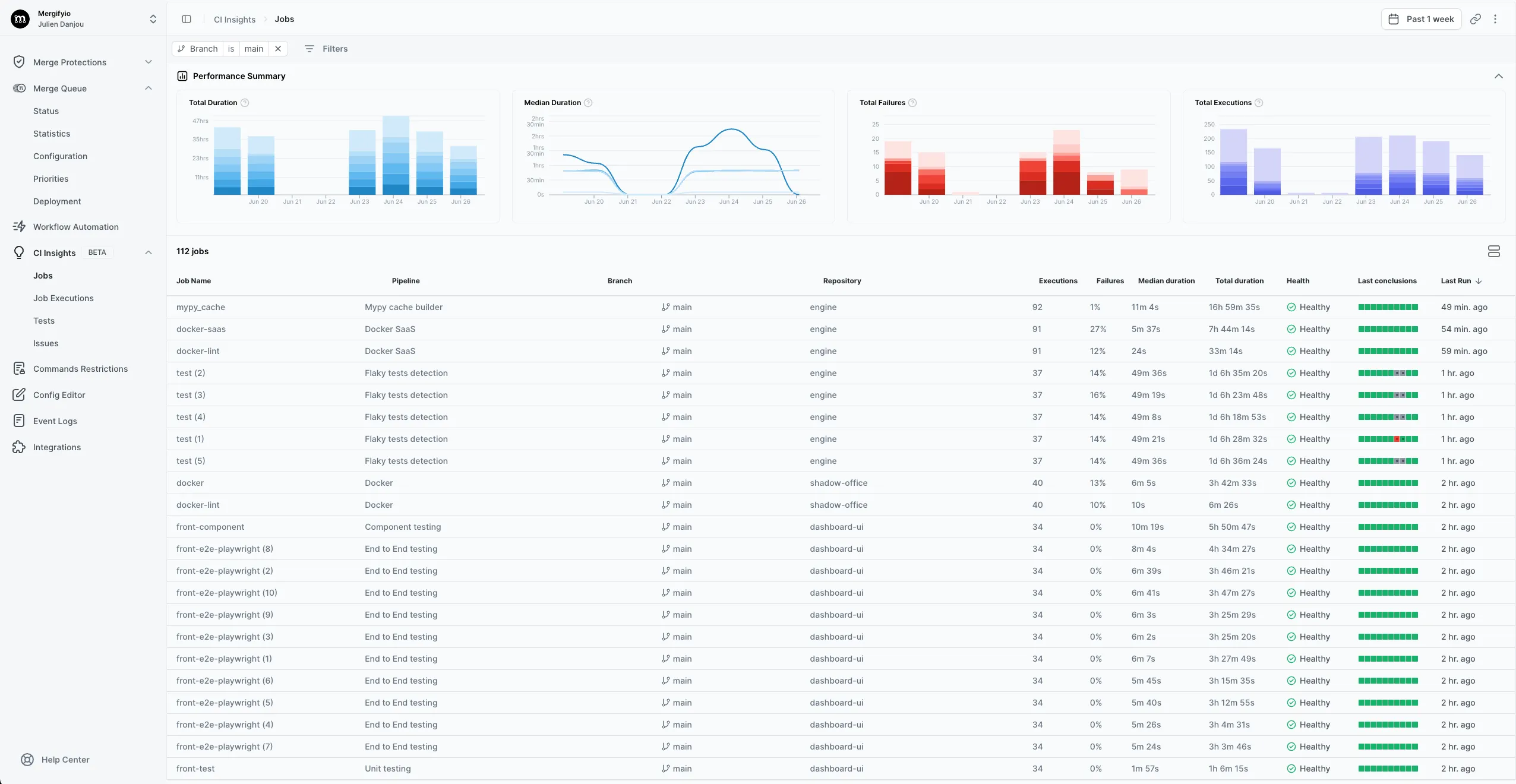CI Insights Setup – GitHub Actions
Enable Mergify CI Insights and configure flaky test detection using GitHub Actions.
This page explains how to enable CI Insights for a repository using GitHub Actions and how to configure repeated test executions for flaky test detection.
Enabling CI Insights for GitHub Actions
Section titled Enabling CI Insights for GitHub Actions-
Enable CI Insights on your repositories by visiting the GitHub Integration page (docs).
-
In order to upload your test results, you’ll need to configure your test. Before doing so, create an application key with
ciscope as described in the API Usage documentation and set it asMERGIFY_TOKENin your GitHub Actions secrets.This key will be used to upload test reports.
-
Click on
CI Insightsin the Mergify dashboard navigation. You should start seeing your GitHub Actions job runs appear:
Setting Up Flaky Test Detection
Section titled Setting Up Flaky Test DetectionTo effectively detect flaky tests, you need to run the same tests multiple times on the same code (identified by the SHA1 of the repository). This section explains how to set up your CI to systematically detect flaky tests.
Prerequisites
Section titled PrerequisitesBefore setting up flaky test detection, ensure you have:
-
Enabled CI Insights for your repository
-
Created an application key with
ciscope and set it asMERGIFY_TOKENin GitHub Actions secrets -
Configured test integration (e.g.,
pytest-mergifyormergify cli upload) for your test framework
GitHub Actions Setup
Section titled GitHub Actions SetupThe recommended approach is to use a scheduled workflow that runs your test suite multiple times on the default branch. Here’s an example configuration that runs tests twice daily with 5 parallel executions:
- Example with native integration (e.g.
pytest-mergify)
name: Continuous Integrationon: pull_request: schedule: - cron: '0 */12 * * 1-5' # Every 12 hours, Monday to Friday
jobs: test: runs-on: ubuntu-latest steps: - name: Checkout uses: actions/checkout@v4
- name: Setup your environment # Add your specific setup steps here (Python, Node.js, etc.)
- name: Run Tests env: MERGIFY_TOKEN: ${{ secrets.MERGIFY_TOKEN }} RUN_COUNT: 5 # Number of times to run each test run: | # Run your test suite multiple times to detect flakiness set +e failed=0 for i in $(seq "$RUN_COUNT"); do pytest tests/ exit_code=$? if [ $exit_code -ne 0 ]; then failed=1 fi done exit $failed- Examples with
mergify cli uploadintegration
name: CIon: pull_request: schedule: - cron: '0 */12 * * 1-5' # Every 12 hours, Monday to Friday
jobs: test: runs-on: ubuntu-latest
steps: - uses: actions/checkout@v4
- name: Setup your environment # Add your specific setup steps here (Python, Node.js, etc.)
# Modified: Run tests multiple times for flaky detection - name: Run tests env: # Run tests 5 times on schedule, once on pull_request RUN_COUNT: ${{ github.event_name == 'schedule' && 5 || 1 }} run: | # Run the test suite based on RUN_COUNT for i in $(seq $RUN_COUNT); do echo "Running test suite - attempt $i of $RUN_COUNT"
# Run your test command with unique output file, e.g.: # npm test -- --reporters=default --reporters=jest-junit --outputFile=test-results-$i.xml done
# Upload all test results to CI Insights - name: Upload test results if: always() uses: mergifyio/gha-mergify-ci@v6 with: flaky_test_detection: true token: ${{ secrets.MERGIFY_TOKEN }} report_path: test-results-*.xmlConfiguration Tips
Section titled Configuration Tips-
Frequency: Running twice daily (every 12 hours) provides a good balance between detection accuracy and resource usage
-
Default Branch Only: Focus on the default branch where flaky tests have the most impact
-
Weekday Schedule: The example runs Monday to Friday (
1-5) to avoid running when no changes are made on the code -
Job name: Ensure the job name is the same as the one running tests on your pull request, allowing CI-Insights to identify them. It can be overriden with
MERGIFY_JOB_NAMEif needed.
Key Environment Variables
Section titled Key Environment VariablesMERGIFY_TOKEN: Application key withciscope for uploading test results to CI InsightsRUN_COUNT: Number of times to execute each test within a single jobMERGIFY_JOB_NAME: The job name reported to CI Insights
Was this page helpful?
Thanks for your feedback!